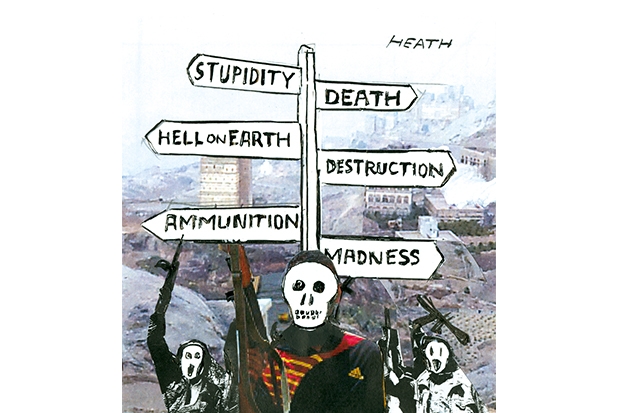Most nights Saudi bombers fly low over the Yemeni capital of Sanaa dealing out random destruction. High up in the Yemeni mountains, Sanaa claims to be the oldest inhabited city in the world. Its old city, a Unesco world heritage site, is at least as unique, ancient and priceless as any western city. Many of its buildings have been destroyed or damaged by Saudi bombs. Imagine the outcry in the West if Venice or Florence were being targeted in this way. However, nobody seems to care one way or another about Yemen. This is because the country is under attack from Britain’s oldest ally in the region, Saudi Arabia. So that’s all right then.
Sanaa is in the hands of Houthi rebels. Elegantly clad in thowbs, with Kalashnikovs flung over their shoulders, the rebels frequently cause offence by bringing their weapons with them into restaurants, contrary to local practice. Many of their fighters have not reached puberty. The Saudis accuse the Houthis of being agents of Iran. There is no question that their hideous slogan, plastered in all public spaces, is inspired by the Islamic Republic: ‘God is Great, Death to America, Death to Israel, A Curse upon the Jews, Victory to Islam.’
Left to themselves the people of Sanaa might well have cast out the Houthis, a northern clan who captured the city two years ago. The bombing campaign from the Saudi-led coalition has instead made them immensely popular. The Saudis have destroyed schools, hospitals, market places, residential suburbs. ‘I dislike the Houthis,’ one Sanaa official confided, ‘but we have to choose between two evils. One evil is bombing us from above. The Houthis are merely making things difficult for us. Given the choice between the two, I would rather the ones who are making things difficult for us.’ One widow outside a water distribution point put it more strongly: ‘If the aid is coming from aid agencies, we want it. If it’s coming from the Saudis, we’d rather starve to death.’
The Saudis’ closest allies in this horrible affair are Britain and the United States. We supported King Salman when he declared war in March last year. In the face of a mountain of evidence that crimes have been committed, Britain repeatedly insisted that the Saudis have not breached international humanitarian law. Britain has advisers in the heart of the Saudi command centre which sets targets for the bombers. We provide Saudi with crucial diplomatic cover, for instance blocking Dutch calls for a very badly needed independent inquiry into war crimes by all sides. Throughout the war we have supplied arms to the Saudis. This is almost certainly illegal. The Arms Trade Treaty, enthusiastically supported by Britain two years ago, insists that no arms should be sold when there is an ‘overriding risk’ that they will be used in breach of international humanitarian law. There is no question that the provision applies in the case of Yemen. Approximately 10,000 have been killed, many of those by Saudi bombing, most of them civilians, while millions have been made hopeless and even more now live on the edge of starvation.
The former British prime minister David Cameron, as well as his foreign secretary Philip Hammond, were strong supporters of the war on Yemen. But what of Theresa May and her new Foreign Secretary, Boris Johnson? There are some fascinating signs that policy is changing. Within weeks of taking office, Mr Johnson (who contrary to some predictions has got off to a strong and confident start) forced the Foreign Office to correct its convenient but mendacious line that Britain had ‘assessed’ that Saudi Arabia had carried out no breach of international humanitarian law. This assertion, carelessly repeated many times during the Hammond era, was completely false. No such assessment, we now know, had ever been carried out. Then Mr Johnson infuriated the Saudis by restoring full diplomatic relations with Iran, which Saudi Arabia regards as its existential enemy.
However, the Foreign Secretary’s biggest challenge comes over the next two weeks, with the UN Human Rights Council meeting in Geneva. This is the forum where last year Britain disgracefully helped to block that Dutch-led initiative for an independent inquiry into Yemeni war crimes. Zeid Ra’ad Al-Hussein, the UN High Commissioner for Human Rights, announced in his opening speech on Tuesday that the subject will raise its head again this year. Mr Johnson should make certain that Britain supports it this time. Such an action would anger Saudi Arabia, along with its powerful allies in the British foreign policy establishment. The new Foreign Secretary needs to take them on.
Over and over again during my week-long stay in Yemen, I was approached by men who said they remembered British colonial rule. They told me that (unlike the United States) we are still regarded fondly. ‘Why have you switched sides to the Saudi barbarians? Have the British been bought by Gulf money?’ I told them that there is no doubt at all about that.






Comments